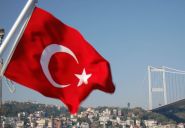- Home
- Middle East
- Aleppo Loss Marks a Turning Point for Assad’s Regime

Syrian President Bashar al-Assad ©Rami al SAYED / AFP
The ease with which rebel groups captured Aleppo (North) and advanced toward central Syria has shaken Bashar al-Assad’s legitimacy, fueling the ambitions of his opponents, analysts unanimously say.
The capital remains well-defended, with the army launching a counteroffensive on Wednesday, aided by Russian airstrikes. However, the blow dealt in Aleppo, the country's economic hub, carries significant weight.
"The regime fought fiercely between 2012 and 2016 to retake half of the city, so losing it so quickly represents a humiliating defeat and underscores the regime's fragility," said Charles Lister of the Middle East Institute in Washington.
The rebels' advance surprised many, possibly even their own ranks. However, it is not entirely illogical.
"Since 2011, the Syrian army has faced a decline in personnel, equipment and morale," explained David Rigoulet-Roze, an associate researcher at the French Institute for International and Strategic Affairs.
Underpaid soldiers often "live off the land," with many young men refusing conscription. Around and within the outskirts of western Aleppo, "regime forces at checkpoints packed up and left," he told AFP.
The army "avoided confrontation, abandoning large quantities of military equipment," echoed the Istanbul-based Harmoon Center, highlighting the regime's weakness outside the capital.
‘Risk of destabilization’
Despite preparations, Iraqi researcher Aymenn al-Tammimi noted that Damascus had mobilized military forces "as a precaution against an insurgent attack," but it was "insufficient."
He pointed to "complacency from the government and its allies," potentially based on the assumption that the 2020 ceasefire would hold.
There may also have been overconfidence in the effectiveness of Syrian defensive lines or a belief that rebels would not dare to directly challenge a city as significant as Aleppo.
As Western capitals paid little attention to Syria, assuming Assad had nearly won the civil war that began in 2011, the rebel offensive reshuffles the deck.
"War, sanctions and an economy that isn’t recovering… The regime no longer has the popular support it once enjoyed among parts of the population in 2011," explained Fabrice Balanche, author of Lessons from the Syrian Crisis, to AFP.
The fallout extends well beyond northern Syria. Weekend rumors of coups spread rapidly, further damaging the image of an already weakened regime, even if the rumors lack a solid foundation.
"There is a risk of destabilization or even a coup," agreed Rigoulet-Roze. "Three-quarters of the population live below the poverty line. Dissatisfaction, crossing sectarian lines, is growing," he added.
"It is now a question of survival not only for Assad’s clan but for the entire Alawite community, which remains united behind the regime."
A fractured Moscow-Tehran axis
Worsening matters, Syria’s two major allies, Moscow and Tehran, are constrained in their capacity to help. Russia’s military is focused on the war in Ukraine, while Iran and its proxies – chiefly Hezbollah – are weakened from their confrontation with Israel.
Russian airstrikes supported Damascus’ forces around Hama on Wednesday. But analysts believe that without significant ground involvement from Assad’s allies, retaking Aleppo is impossible.
This crisis comes as Assad attempts to recalibrate his alliances in favor of Moscow, frustrating Tehran. "Assad knows his regime might now be hanging by a thread. He wants to align more closely with Moscow to reduce his dependence on Tehran," said Rigoulet-Roze.
Indeed, Russian-Iranian relations are "not always optimally trusting," marked by "a convergence of interests" that does not preclude mutual suspicion, or even distrust.
Does Assad himself feel threatened? "He thought he had won but started fearing he might be forced to implement the UN Security Council resolutions (from 2015) and agree to a political transition," speculated the Harmoon Center.
Rebel pressure may soon be compounded by jihadists from the Islamic State group.
"The regime’s best units, previously deployed against ISIS, have all been withdrawn," warned Lister. "Suddenly, in central Syria, where ISIS is rebuilding, there is a complete void."
Didier Lauras, with AFP
Read more



Comments